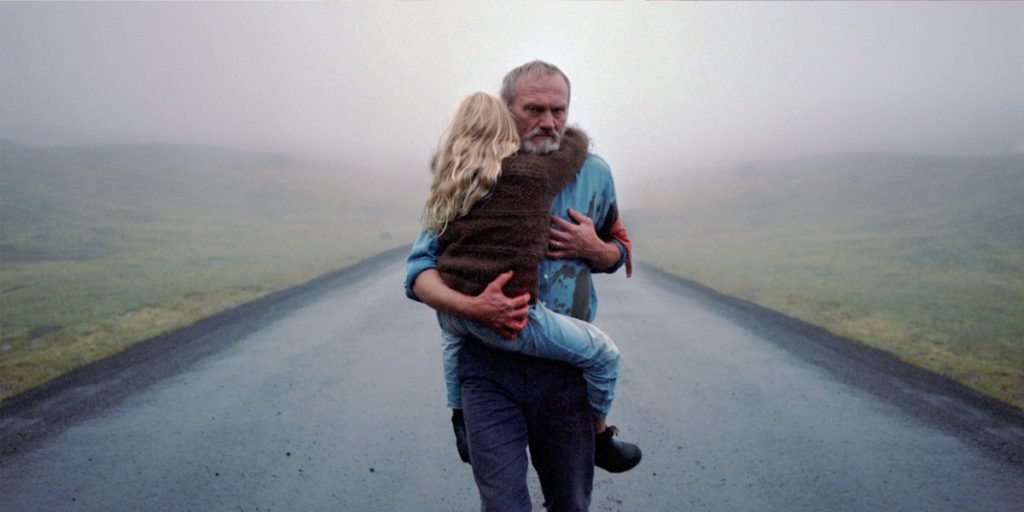Hlyun Pálmason’s patient and assured hand guides A White, White Day with profound, naturalistic simplicity.
A White, White Day is an evocative, mournful experience. It opens with an unnervingly silent car, cruising delicately and precariously through a consuming fog until it careens off-road. The motion of this crash is neither jarring or energetic, and the screech of steel is quickly swallowed back up by the sheer vastness of the natural silence around it. This opening embodies the film; epitomizing the unique sense of comfort derived from the realization that we are all cosmically voiceless. That our presence in nature is one of being folded into it as we live, and quietly buried in it as we perish.
Truthfully and reductively, A White, White Day is better felt than explained, its plot is threadbare and expository dialogue is largely absent. It is an experience inferenced from subtle emotions and long stares. In short, it follows Ingimundur (Ingvar Sigurdsson), a widowed policeman intent on emotional repression and self-infliction, as he cares for his granddaughter Salka (Ida Mekkín Hlynsdóttir) and investigates the potential marital infidelity of his late wife. Pálmason describes the film as portraying “two kinds of love”, the “pure and unconditional” love one feels for their children or grandchildren, and the “complex and animalistic” love one feels for their partner. Ingimundur is burdened by and through the love of his late wife, continually stifling and self-sabotaging memories of her. Yet, of course, this pain is inescapable. It manifests in the ethereal and stunning vistas of Iceland: in the horses that rummage through abandoned areas, in rocks tumbling and shattering down cliffsides, and in children’s TV programs.
Pálmason revels in these natural spaces of introspection, identifying and utilizing the dualistic rhythm of nature and humanity in frame- the passing of time while Ingimundur repairs a house, the contemplative communal showers, and inopportune piano recitals. A White, White Day is unshakably aware of the way that life interrupts out most sincere moments, and how we ourselves come to tarnish the best of memories. While Pálmason states their outright avoidance of genres, there are films that feel connected to A White, White Day’s atmosphere and emotional approach. Debra Granik’s drama, Leave No Trace (2018), is similarly about the inseverable thread that connects a family. And in its more harrowing finale, A White, White Day shares atmosphere with Lee Chang-dong’s psychological thriller Burning (2018), as both films wrestle with the individual, emotional closure that violence may tantalizingly bring about.
Yet, A White, White Day is decidedly not a thriller. It’s an encapsulation of grief bore by a stereotypical, but no less riveting, “strong, silent type” of man and masculinity. Ingimundur’s violent stubbornness and emotional stoicism is made all the more caustic and paradoxical by his tangible love for Salka. In its most unique moments, Pálmason finds relief in the sharing of grief between enemies, pivoting from a crushing revelation to a cathartic, indescribable sense of shared, intimate loss with poignant grace.
For as derivative as it may seem in surface plotting (a grief-ridden, rigidly
classic man attempts to resolve his pain through violence), A White, White Day is a warmly welcomed addition to the selection of films that expose male vulnerability. Pálmason’s decision to background exposition and manifest symbolism through nature is immediately captivating and continually effective. Pálmason, Sigurdsson, Hlynsdóttir, and crew have given the survivors of loss a therapeutic and compassionate invitation to mourn in company. A reassurance that the echo of pain is better than the silence of grief- so yell confidently and expressively into a darkened tunnel. Hear it echo back to you. Let it.
“Describe her.”
“She was warm.”
A White, White Day premiered on Curzon Home Cinema, as part of the Edinburgh Film Festival at Home, and is now available to watch on demand.

